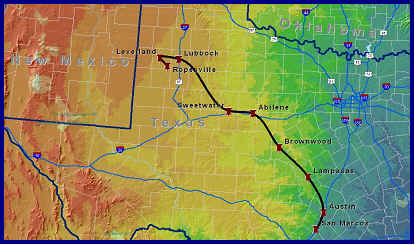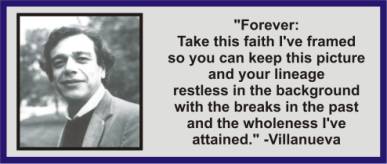LITR 4333: American
Immigrant Literature

Student Poetry Presentation 2006
Tuesday, 28 February
Poem:
Tino Villanueva, “Haciendo Apenas la Recoleccion,” UA
191
·
Poetry reader:
Peggy Johnson

Haciendo Apenas la
RecolecciÓn
(As
soon as the harvest is gathered or A Farmworker's recollection)
by: Tino Villanueva
For weeks now
I have not been able
to liberate me from my name.
Always I am history I must wake to.
In idiot defeat I trace my routes
across a half-forgotten map of Texas.
I smooth out the folds stubborn
as the memory.
Let me see: I would start
from San Marcos,
moving northward,
bored beyond recognition
in the stale air of a '52 Chevy:
to my left, the youngest of uncles
steadies the car;
to my right, Grandfather finds humor
in the same joke.
I am hauled among family
extended across the back seat,
as the towns bury themselves forever
in my eyes: Austin,
Lampasas, Brownwood,
past Abilene, Sweetwater,
along the Panhandle's alien tallness.
There it is: Lubbock
sounding harsh as ever.
I press its dark letters,
and dust on my fingertips is so alive
it startles them
as once did sand.
Then west, 10,000 acres and a finger's breadth,
is Levelland
where a thin house once stood,
keeping watch over me and my baseball glove
when the wrath of winds cleared the earth
of stooping folk.
There's Ropesville, where in fifth grade
I didn't make a friend.
My arm is taut by now and terrified.
It slackens,
begins falling back into place,
while the years are gathering slowly
along still roads and hill country,
downward
to where it all began – 500 McKie Street.
I am home, and although the stars
are at rest tonight,
my strength is flowing.
Weep no more, my common hands;
you shall not again
pick cotton.

Tino
Villanueva
Biographical
Note:
Poet and writer Tino
Villanueva was born on December 11, 1941, in San Marcos, Texas to a family of
migrant workers. Because of the demands of traveling to harvest crops,
Villanueva was never able to attend school regularly. Despite the hardships, he
managed to graduate from San Marcos High in 1960 and began working on an
assembly-line at a local furniture factory. In 1963, he was drafted into the
United States Army in 1963 and spent two years in the Panama Canal Zone. There
he became immersed in Hispanic literature, reading the works of poets such as
Ruben Dario and Cuban revolutionary José Martí. Upon returning to San Marcos,
he took advantage of the GI Bill to study English and Spanish at Texas State
University-San Marcos. He completed his B.A. in three years and then moved to
Buffalo, New York to attend the State University of New York. He finished his
M.A. in 1971 and moved to Boston University, where he began his doctoral
studies. He earned a Ph.D. in Spanish literature and teaches Spanish and
translation at Boston University.
Instructor’s Question:
How does Hispanic or Caribbean literature resemble or differ from either
the immigrant narrative or the minority narrative?
Objective 3.
To compare and contrast the immigrant narrative with the minority
narrative – or, American Dream versus American Nightmare
Tino
Villanueva, was quoted in the May 2000 issue of The Texas Observer, that he would "not want to live in a
literary barrio." He is
recognized as a highly acclaimed Chicano writer as well as a gifted painter, who
writes in his poem, Haciendo Apenas la
RecolecciÓn:
Always
I am history I must wake to.
In
idiot defeat I trace my routes
across
a half-forgotten map of Texas.
Villanueva's poem traces a
personal history that he is powerless to forget. As a youth, he followed the routes of migrant workers who
picked fruit and cotton as they followed the seasons, until finally, after the
harvest was gathered he was able to return to school.
But, more than often, he was away from school traveling a migrant's path.
When he was able to return to school, he imagined a life that brought
hope of assimilation into normal American society as is revealed in the
following lines:
where a thin house once
stood,
keeping watch over me and my
baseball glove
when the wrath of winds
cleared the earth
of stooping folk.
His dreams, as a second
generation American, were reminiscent of immigrant dreams of successfully
assimilating into American society. However,
Tino faced minority discrimination and segregation while living in Texas during
the 1950's, as in the poem he recalls, "where in fifth grade I didn't make
a friend." He is well-known for the book-length poem, Scene from the Movie GIANT, that addresses anti-Mexican racism –
American dream versus American nightmare. Villanueva's
identification with the predicaments of his youth ties him to his past.
This creates a strong resistance to complete assimilation, unlike the
traditional immigrant who blends into dominant American culture, his early
struggles long forgotten as he resides instead in the shadow of his future, not
of his past.
Tino's journey finally
takes him away from the migrant hardships of his youth and he attains education
and literary success, as implied with the words, "Weep no more, my common
hands; you shall not again pick
cotton." This appears to imply
that Villanueva is a model of immigrant success because American dreams are
realized. However, Villanueva's
achievements are always inescapably reflective of his past.
This distinction marks a vivid contrast to immigrant narratives
whose assimilation makes them wholly American by dissolving their "old
world" roots.
Villanueva's world lies
somewhere in-between that of the forced African American immigrant or the
American Indian whose world was blanketed by the dominant culture of the
European immigrant whose past was willingly erased. Therefore, I conclude that Tino's minority distinction is in
his ability to tenderly uncover and cling to the vulnerability of his youth, and
with unyielding hope "smooth out the folds stubborn as the memory" that
permeate his Hispanic identity, and all of the missed opportunities of his early
life.
Question 1:
What do the words, "and dust on my fingertips is so alive it
startles them as once did sand," signify to you in relation to the poem?
Could
it mean that the sensation of sand on his fingers causes him to recall a time in
his youth when his hands were used for harvesting as opposed to being used to
express his creativity?
Question 2:
What do you think that Tino Villanueva commented that, he would "not
want to live in a literary barrio?"
Tino
Villanueva's response to my question regarding the title of the poem, Haciendo Apenas la RecolecciÓn:
February
4, 2006
Dear Peggy Johnson,
I'm flattered you're taking the time to read and discuss (?) one of my poems
from some time ago, from my book Shaking Off the Dark (1984; 2nd
edition 1998). The title of the poem is a bit complicated, for I intended
it to have a triple meaning; I'd be too wordy to try to explain each
possibility. So, when I read it before an audience--the poem is one
of my favorites--it simply goes under the generic name of "A
Farmworker's Recollection."
The title's complexity stems from the fact that two of the words have a double
meaning in Spanish: apenas (hardly, barely); a penas
(painfully); la recoleccion (the picking / gathering [of the
crops]; la recoleccion (also means ''memory''). Therefore,
the expression ''hacer la recolleccion'' would mean either "to
remember" or "to pick / to gather in" [the crops].
So one cannot arrive at one simple title, but at several. And that was the
purpose--for it to resonate with native-speakers especially when the latter are
looking at the text, but only hearing the title being read...so is it apenas or
a penas and how should ''recoleccion'' be interpreted in relationship to
this / these word(s)?
Consequently, "A Farmworker's Recollection'' is good enough to introduce
the poem. This is the best I can do, I'm sorry.
If you have further questions, don't hesitate to contact me.
Good luck on your presentation. Sincerely, TVillanueva
[Later email from Villanueva]
May 13, 2006
Dear Peggy Johnson,
Eureka! Thank you much for the wonderful map and comments.
Authors like to be read, so please know I appreciate your taking the time to pay
attention to one of my poems...and I see you got well rewarded for your efforts.
I wish you much success with your future graduate work.
Sincerely, TVillanueva
|
|
|
|


